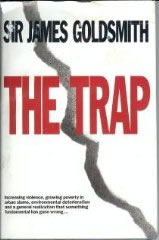
[CAF Note: Reposting this for the second time given ongoing events in Greece and the Eurozone]
You are an opponent of the project for single currency. Why?
The effects of a single currency go far beyond the economy. They would transform the political structure of Europe as well as the stability of its societies.
 A currency is both an economic tool and a reflection of the economic and social condition of a society. The quantity of available money must be determined in a way which does not lead to unacceptable levels of inflation, deflation or other disruptions. Obviously, a single currency would mean that the principal economic strategy of each European nation would also need to be determined centrally. It would be impossible to have a single currency while at the same time maintaining different economic programmes in each of twelve nations.
A currency is both an economic tool and a reflection of the economic and social condition of a society. The quantity of available money must be determined in a way which does not lead to unacceptable levels of inflation, deflation or other disruptions. Obviously, a single currency would mean that the principal economic strategy of each European nation would also need to be determined centrally. It would be impossible to have a single currency while at the same time maintaining different economic programmes in each of twelve nations.
The true purpose of proposing a single currency is to force through the creation of a unitary European state while pretending to promote a purely economic idea. It is yet another example of the Eurocrats acting by stealth so as to achieve their aim of a homogenized European union. Furthermore, a single currency would disrupt European societies. To understand the effects of a single currency imposed uniformly on both rich and poor regions, look at Italy.
The economy of northern Italy is highly competitive compared to the remainder of Europe, whereas that of the south is not. Obviously, the currency used in the south cannot be adjusted relative to that of the north in order to reflect the differences in their economies because the south and the north maintain the same currency. The economy in the south stagnated and unemployment increased. Unemployed southerners moved north to seek work and to stem this migration Italy subsidized investment in the south to create jobs. To do this, special institutions were formed such as the Cassa del Mezzogiorno and its successors, through which were channeled massive transfers of funds to the south. The policy failed. Much of the investment went into useless bureaucratic mega-projects and much was stolen or diverted for political purposes. Instead of generating employment, the subsidies generated corruption. They also failed to stop migration, which continued to uproot southern communities and to overpopulate and destabilize those in the north. This is a typical case of mutual poisoning. Families and communities in the south are destroyed and urban slums and social crisis develop in the north.
This fiasco caused great resentment in northern Italy, resulting in the formation of the Lombardy League, whose platform is to re-establish autonomy for the north. The League has become an important political movement and is part of the present governing coalition.
These subsidies and migrations took place within the same nation, yet they aroused strong separatist passions. Imagine how much greater would be the resentment if they took place between different nations, such as Greece and the Netherlands or Spain and Germany. Undoubtedly, there would be great tensions if at some time in the future Greece and Spain—or indeed any other nation—were unable to maintain the standards of economic stability prevalent in the Netherlands or Germany. With a single currency, no individual nation would be able to adjust the value of its currency to reflect its own economic realities. The results would be the same as in Italy, but on a much larger and more devastating scale: uprooting of the peoples of unsuccessful nations; mass migration; destabilization of the towns in successful nations; emergence of centrifugal forces which could create possibly violent separatist movements and pull Europe apart.
From the book The Trap by Sir James Goldsmith
Previous blog posts on Sir James Goldsmith
